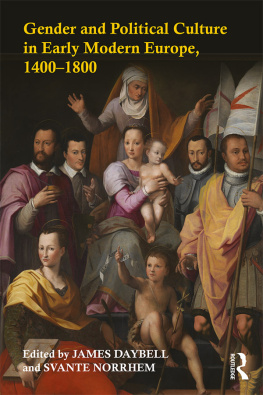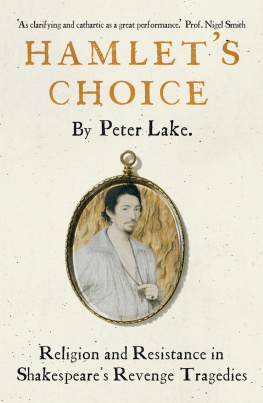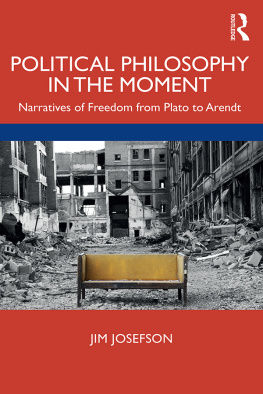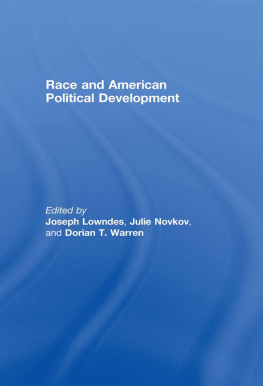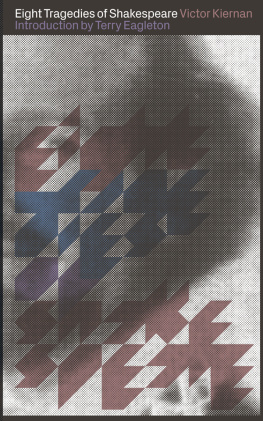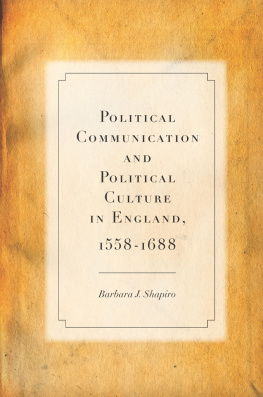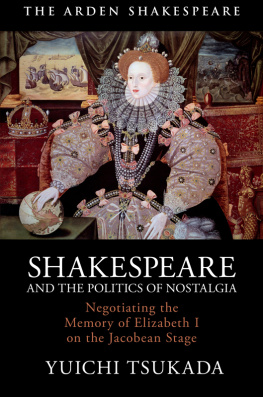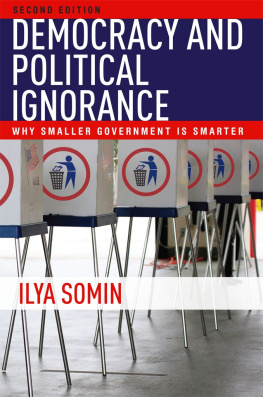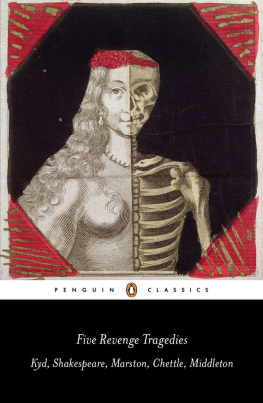Hamlets Moment:
Drama and Political Knowledge
in Early Modern England
Andrs Kisry
Title Pages
(p.i) Hamlets Moment
(p.iii) Hamlets Moment

(p.iv) 
- Great Clarendon Street, Oxford, ox2 6dp,
- United Kingdom
- Oxford University Press is a department of the University of Oxford.
- It furthers the Universitys objective of excellence in research, scholarship,
- and education by publishing worldwide. Oxford is a registered trade mark of
- Oxford University Press in the UK and in certain other countries
- The moral rights of the author have been asserted
- First Edition published in 2016
- Impression: 1
- All rights reserved. No part of this publication may be reproduced, stored in
- a retrieval system, or transmitted, in any form or by any means, without the
- prior permission in writing of Oxford University Press, or as expressly permitted
- by law, by licence or under terms agreed with the appropriate reprographics
- rights organization. Enquiries concerning reproduction outside the scope of the
- above should be sent to the Rights Department, Oxford University Press, at the
- address above
- You must not circulate this work in any other form
- and you must impose this same condition on any acquirer
- Published in the United States of America by Oxford University Press198 Madison Avenue, New York, NY 10016, United States of America
- British Library Cataloguing in Publication Data
- Data available
- Library of Congress Control Number: 2015949826
- Printed in Great Britain by
- Clays Ltd, St Ives plc
- Links to third party websites are provided by Oxford in good faith andfor information only. Oxford disclaims any responsibility for the materialscontained in any third party website referenced in this work.
Frontispiece
(p.ii)
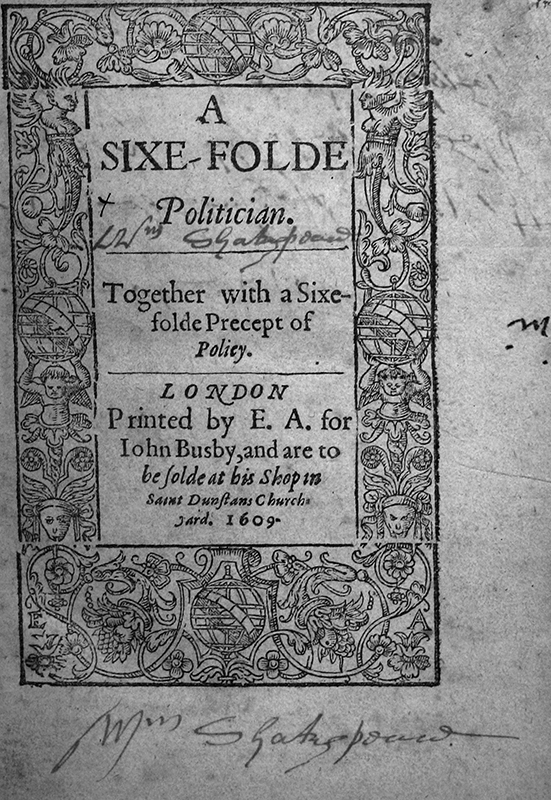
Frontispiece. Shakespeares signature on the title page of John Melton: A Sixe-folde Politician: Together with a Sixe-folde Precept of Policy (London: E.A. for Iohn Busby, 1609), a forgery by William Henry Ireland. Folger STC 17805 copy 1.
Photograph by Andrs Kisry, from the collection of the Folger Shakespeare Library.
Contents
(p.v) Acknowledgements
Most of this book was written in 201114, but the debts I incurred in the process extend much further back in time. Jean Howard, David Kastan, and Alan Stewart supervised a dissertation which contained early versions of some of the materials here. The three of them remain formative influences. Jean has been a model of commitment, control, and cheershe taught me to attend to form and argument, both literary and scholarly, but also to attend plays. Davids thinking seemed to resonate with my vague ideas about books and writing with surprising and enabling force, but he would also send me out on a limb and then wait for me to realize why it was worth it. If Jean and David were doctoral parents of a whole generation at Columbia, Alan was like an older brother who makes all he is doing seem easy and cool: his attention and generosity opened up a realm of intellectual possibility, making me look for the people who did the reading and writing.
Hamlets Moment was shaped by other teachers as well. Conal Condren encouraged at important moments, and demanded a conceptual clarity I wish I could muster. Pter Dvidhzis essay about Polonius first alerted me to the play of power in Hamlet, but his advice has never been Polonius-like. Heather James listened and helped since a rainy afternoon in D.C., and unlike this book, our friendship will continue. Peter Lake made me understand what I was writing about, and taught me most of what I know about early modern politics and its historians. Many of my ideas came from the work of Fritz Levy, who later also encouraged the formulation of others. Ivan Lupi commented carefully and selectively, and drove me around recklessly, and I expect him to keep doing both. I need to talk to Noah Millstone more often. There is much in this book I wish I had been able to show Dnes Nmedi. Joanna Picciotto appeared to believe in the project very early, but her gift helped especially in its final stages: she gave me and my book the most exacting yet most generous reading. Julianne Werlin pointed out what was missing and made me try to fix it. George Donaldson, Istvn Gher, Gza Kllay, Scott Long, John Lyon, dm Ndasdy, Bruce Robbins, Klmn Ruttkay, and Ferenc Takcs were my teachers long before this book would have begun, but they are there in how I write and think.
Fellow students Avishek Ganguly, Dehn Gilmore, Rishi Goyal, Musa Gurnis, Matt Sandler, Alex Smith, Eugene Vydrin, and Lauren Walsh deserve equal thanks. With Tiffany Werth, my mediatrix, we share more than our birthday. Allison Deutermann and I have lived parallel lives for well over a decade now. With Matt Zarnowiecki we also shared the experience of southern exposure. The two of them, along with Andrea Walkden, Gavin Hollis, and Vim Pasupathi, read versions of some of the chapters that follow and discussed them over what wines we could afford in Long Island City.
Julie Crawford, Adam Hooks, Lorna Hutson, Jim Shapiro, and Peter Stallybrass read, helped, and supported in ways that were truly crucial. Alan Bryson, Jeff Doty, (p.vi) Matt Hunter, David Gehring, Penny Geng, Jason Powell, Aaron Pratt, Angus Vine, Lizzy Williamson, and Adam Zucker have been wonderful interlocutorsas were Alan Farmer and Zachary Lesser, whose SAA seminar allowed me to try out a part of what became the first chapter of this book. Tiffany Stern disagreedthis book is a recognition of how right she was. Gabe Cervantes, Jon Farina, Dahlia Porter, Allison Schachter, Sandy Solomon, and Ben Tran helped me refocus, but also made 20089 one of the best years I have had.
Personal and intellectual lives are inseparable, and my friends interest in some part, or none, of what follows, was always a source of pleasure. Zsfi Bn, Ferenc Csirks, Mikhal Dekel, Rishi Goyal, Zsolt Komromy, Zoltn Mrkus, Kati Orbn, Szilrd Papp, Laurent Stern, and Paul Stewart listened to ideas early and late. For her care and companionship, brilliance and inspiration over twenty years, I will never be able to properly thank gnes Berecz.
At City College, Fred Reynolds supported my research and offered shrewd advice, and Eric Weitz helped and pushed me to finish. Renata Miller and Paul Oppenheimer offered useful guidance as my department chairs, and with Emily Greble, Dan Gustafson, Mark Mirsky, and Hap Veeser, were also among the colleagues on whom I was especially dependent as I was writing this book. Liz Mazzola read more, and more quickly, than almost anyone, and has been a model of productivity and determination.


